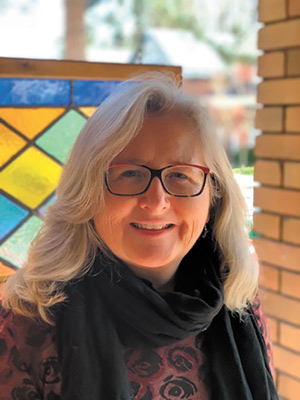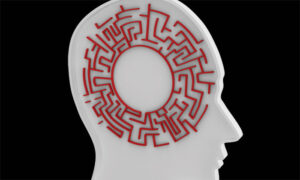Amidst the darkness and uncertainties of the past year, there have been some gifts in this pandemic time. One of these gifts has been increased acknowledgement of the existence of mental-health challenges, and of the reality that, for many, this is a profound struggle. Headlines this year have focused on the pervasive negative impacts of living with poor mental health or a diagnosed mental illness. Sometimes it takes the extraordinary to shine a light on challenges that have long existed.
Through 32 years of work in the field of mental health and well-being I have long sought to name and normalize the reality that we all deal with varying states of mental health and mental un-wellness, whether or not we are ever diagnosed with mental illness. And many, if not all of us, will be impacted by mental illness, personally or in the life of someone we care about. In my work, it has been a privilege to engage in conversation with individuals and congregations about our understandings and experiences of mental health and mental illness.
Exposing myths and misconceptions
Some of the myths and misconceptions that accompany mental illness may make us judgmental or reticent to share our struggles. The lack of clarity that accompanies a diagnosis can make mental illness seem confusing. Some of the uncertainty comes from a lack of understanding, and we fear what we don’t understand. When we feel uncomfortable with a person or situation, it is harder to trust in ourselves—to know what to do or say. It may be tempting to pull back, to avoid. But faith communities are called to understand and respond in supportive ways.
Mental illness ranges from one-time or time-limited episodes, to chronic or long-term illness. How much mental illness defines our experience varies by the nature and intensity of the illness. While individuals may have some shared experiences, even with the same diagnosis they can have different experiences because of each unique story. Sometimes we seek to differentiate mental health from physical health when, in reality, the two are deeply intertwined. Struggles with mental illness impact us physically, and likewise physical illness impacts our mental health.
We can also be in a great deal of emotional or relational pain without having a defined mental illness. The feelings of depression that may accompany a job loss or the end of a relationship may not reach the full scope of a clinical depression, but we might still experience significant distress—distress that interferes with the ability to function and prompts us to seek help. We all struggle at times. This means that whether we have a diagnosed mental illness or not, we need to acknowledge the reality of times of challenge and to take steps to care for ourselves.
Caring for ourselves often involves connecting with others, including a network of professional, social and spiritual supports. It can help us to realize that, whether we have a diagnosed mental illness or not, it is important to put energy into achieving and maintaining a balanced sense of mental health. Caring for ourselves from a place of compassionate reflection is a key component of a meaningful life, as is acknowledging that our quest for wholeness includes a complex interplay of both strength and struggle.
Unfortunately, we may blame ourselves when diagnosed with mental illness, thinking, “If only I had tried harder.” Parents may fault their parenting, children may worry their behaviour was the cause, and spouses may credit the quality of their marital relationship, wondering if they should have expected less of their depressed spouse. Yet when we consider that 20 percent of the Canadian population will have a defined mental illness at some point in their life, we realize that everyone is impacted.
One of the most harmful misconceptions, in the context of a faith community, is that grappling with struggles connected to mental health results from a lack of faithfulness or is rooted in sin. Mental illness evolves from a complex mix of biological, psychological and social impacts. (See sidebar below) Christians are not exempt from struggles with mental illness; dedicated Christians experience mental illness because we’re human. As part of the community of faith, we represent the diversity of human experience and, as such, we are not exempt from the challenges of life.
Sometimes when we are struggling with mental illness, or when we feel mentally unwell, we think we have to keep this struggle a secret, and this prevents us from reaching out for help. Counsellors hear people share their fear that, if others knew about their struggles, they would view them very differently. At times people do respond in less than optimal ways but, if we felt more comfort in sharing our struggles, we would also realize that we are not alone. The human experience includes times of struggle and challenge, whether we have a diagnosed mental illness or not.
Even in the church, we do not always know how to relate with someone experiencing mental illness and their family members, or we don’t feel safe to share our own struggles. When someone faces mental illness, they are still the person we know. They are experiencing an illness, and this illness does not define the whole of who they are. We limit others and ourselves if we allow a diagnosis of mental illness too large a voice in defining who we are.
The grace of creating space
One of the graces we can offer as a faith community is to create space for sharing our struggles. It may be tempting to avoid checking in with people who are struggling because of our own hesitancy and fear. We need to claim the courage to ask how someone is doing and to listen to his or her response, even if it is not positive. Here are some simple practices for responding when someone is struggling:
- Ask someone how they are doing and be prepared to listen.
- Take the pressure off yourself to have answers to the person’s struggles.
- When someone shares with you, take their responses seriously and avoid the temptation to tell them they “shouldn’t” feel as they do.
- If you don’t know how to help, you might gently direct the person to those who can assist more directly. A compassionate ear is not enough if a person requires more formalized help. Support the person in connecting with a family member, pastor, family doctor or a counsellor. All of these are appropriate places to start.
When we are living with mental illness, we may be frightened by what we feel. Giving someone permission to talk about their feelings won’t make them worse and may allow the person to name the extent of their pain. Often the issues are complex and, while there may be no easy or simple answers, the church can play a vital role by being a safe and supportive community for those living with mental illness and for their family members.
I believe that the love of a caring faith community can be a tremendous support when we struggle, but being part of this community doesn’t ultimately prevent the struggle. I have heard many people say that invaluable components of their moving through a time of crisis were the love and support of their community, and others’ continued belief in them when it was difficult to believe in themselves. At these times we have to “hold the hope” for those who cannot do so for themselves.
It is fitting and necessary to encourage ourselves or another person who is struggling to seek professional help. When we create a climate in a family, congregation or workplace where it’s okay to admit our struggle, we set the baseline for people to be open about what’s happening in their lives. A context like this makes it easier to seek help when things are challenging, and it offers encouragement to get help before things deteriorate to a crisis point. Counselling, medication or a combination of both are most often key components of stabilizing symptoms and working at underlying issues. Counselling can be a safe place to name our struggles, work at understanding these concerns, and ultimately take steps toward healing and well-being.
The realities of mental illness have existed throughout history and are not unique to our current time. In Psalm 130, the psalmist frames so well the darkness that accompanies mental illness: “Out of the depths I cry to you, O Lord.” We are called to extend compassion to those who struggle in the shadow of despair—both to others and to ourselves. To not be afraid of this space. To have the courage to seek the help we need. To recognize that doing so is a sign of strength, not failure. And to hold the hope for those who cannot.
Wanda Wagler-Martin has worked in the field of mental health for more than 32 years and has been the executive director of Shalom Counselling Services, in Waterloo, Ont., for the past 24 years. She is leaving this role in June 2021 and will be discerning her next vocational direction.
Components of mental illness
By Wanda Wagler-Martin
One in five Canadians will be diagnosed with a mental illness in their lifetime. Mental illness refers to a range of concerns, from anxiety and depression, to eating disorders, schizophrenia, bi-polar disorder, adjustment disorders, personality disorders and psychotic disorders, and others. The term “biopsychosocial” is one way to describe mental illness, which is impacted by these components:
- Biological: our biochemical makeup, genetics, family history.
- Psychological: our personality factors and resilience, how we respond to stressors, how we make sense of what happens in our life.
- Social: our living conditions, life experiences, trauma and relationships—essentially what we have experienced or gone through.
In understanding our struggle, we need to consider each of these components on the path to resumed well-being.
For discussion
1. When in your life have you have struggled with despair, overwhelming stress or feelings of worthlessness? Has the past year, with its COVID-19 restrictions and isolation, made things more difficult? Where does it feel safe to express these negative emotions?
2. Wanda Wager-Martin writes that one of the most harmful misconceptions is the idea that, “grappling with struggles connected to mental health results from a lack of faithfulness or is rooted in sin.” Why is this idea so harmful for a community of faith? Is this why we tend to hide our own struggles?
3. Wagler-Martin encourages us to share our struggles and to listen to others, saying we should “avoid the temptation to tell them they ‘shouldn’t’ feel as they do.” Why is it so tempting to tell others how they should feel? Why is it so important for us as humans to acknowledge or to express our emotions?
4. Have you ever been called to “hold the hope,” while someone close to you struggled during a crisis? What are the important things to do in this situation? What are some ways that a faith community can express its care and concern for those who struggle?
—By Barb Draper








Leave a Reply
You must be logged in to post a comment.